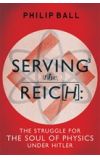
02 Nov 2013 17:40:51
Then, on 6 August, the group heard the news that a nuclear device had destroyed Hiroshima. The physicists were stunned. "This was the first inkling for the German scientists that they had not been ahead of the Allies but had lagged behind pitifully," notes Philip Ball in Serving the Reich.
Hahn was particularly outraged. "You're just second-raters," he shouted at his fellow inmates. For his part, Heisenberg – leader of the Nazi bomb project – refused to believe the report. Only later would he claim he had actually misdirected the programme deliberately to prevent Hitler acquiring an atomic bomb.
This suggestion – supported by several historians in recent years – gets short shrift in Ball's engrossing analysis of physics in the Third Reich. "It is a pernicious myth," he states. In fact, Germany's scientists, including Heisenberg, had tried hard to make a bomb but failed, partly because they had let so many gifted colleagues be exiled to America where they had then helped the US with its A-bomb project. As Ball states, the extraordinary statement that Heisenberg falsified research to stop Hitler getting the bomb requires extraordinary supporting evidence. "Sadly, there seems to be none."
The story is intriguing for it reveals the lack of insight of many of the world's greatest physicists, including Hahn and Heisenberg. They knew an atomic bomb was a genuine proposition but failed to realise it could be built on such a short timescale. They were not alone, of course. As Graham Farmelo makes clear in Churchill's Bomb, the British also let the A-bomb slip from their grasp, thanks in part to failures by Winston Churchill.
Given that Churchill was a mere politician unversed in the intricacies of nuclear physics, such an oversight might seem unsurprising. But Farmelo shows Churchill took a close interest in atomic research for much of his career and even warned, in one newspaper article, that "a bomb no bigger than an orange" could one day "blast a township at a stroke".
Written in 1924, the article demonstrates considerable foresight, though Churchill was only following the lead of HG Wells who had predicted the use of atomic bombs in The World Set Free published in 1914. Despite the ideological gulf that separated the men, they retained considerable respect for each other, Farmelo reveals.
Churchill's abiding interest in atomic bombs therefore makes it surprising that he failed to respond to a 1941 offer from President Roosevelt to be an equal player with America and to allow UK scientists – who had made respectable progress in atomic weapons research – to participate fully in the US bomb project. Much had to do with the workload Churchill placed upon himself and his inability to delegate, Farmelo suggests. He was also poorly guided by his chief scientific adviser, "the clever but supercilious" Frederick Lindemann. In 1942 Churchill tried, belatedly, to renegotiate Roosevelt's offer but he had allowed too much time to lapse. The president had assumed Britain was not interested and told his scientists to go it alone. "Churchill had missed the great opportunity given to him by his nuclear scientists," argues Farmelo in this absorbing account of 20th century atomic politics. The UK did later get a role of sorts in the Manhattan Project, and did subsequently make its own bomb, but it undoubtedly lost a great lead thanks to Churchill's indecisiveness.
These two scientific histories therefore share a common theme – Europe's wasted atomic dreams – and show, in different ways, how Germany, and then Britain, lost their way as potential nuclear leaders. Europe dominated atomic physics research in the 30s. In less than a decade, America was the master, joined later by Russia.
In fact, the books complement each other neatly. Farmelo's account of Churchill's atomic dreams perfectly captures the essence of the man and of the science of the day. Ball is more concerned with the morality displayed – or not displayed – by scientists during Hitler's rise. Most simply worked quietly while colleagues were sacked or sent to camps, he notes.
But was this indifference to the fates of others – as demonstrated by the Farm Hall physicists – a purely German response or was it typical of a more widespread immorality? Ball is emphatic: the German physicists were representative of most scientists of their times. More to the point, little has changed since then. "Science continues doggedly to insist on its abstract purity and detachment from reality," he states. And that, Ball argues, is a very dangerous delusion, one that suggests scientists have not quite learned the full lesson of their behaviour during the second world war.

